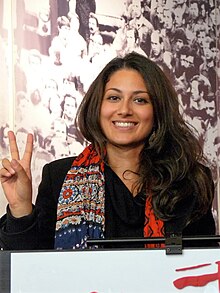Omezzine Khelifa (Arabic: أم الزين خليفة) is a Tunisian politician, activist, and social entrepreneur. Born on 7 July 1982 in Carthage she was raised in La Marsa in the northern suburb of Tunis. After earning her high school diploma in mathematics, she moved to France where she finished her studies as a telecommunications and computer science engineer, specialized in networks and distributed applications. She worked in the finance field as a consultant for Société Générale Investment Banking and fintech compagnies.

Family edit
Omezzine was born and raised in a family of academia. Her father, Mounir Khelifa, is an English Literature Professor in the Faculty of Literature, Arts and Humanities in Tunis. Her mother, Amina Arfaoui, is a writer[1] and a German Literature Professor. She has one brother, Melik Melek Khelifa who is a doctor and a singer, a guitar player and a music composer. Her brother along with his wife, Jelena Dobric, created Persona; a female fronted metal band in Tunisia.[2]
Political engagement and achievements edit
In 2011, Khelifa moved back to Tunisia after involving in the Tunisian Revolution. She joined the Tunisian political party Ettakatol, one of the Government coalition on that time. After twice running for Parliament and becoming an elected member of the political bureau, she was appointed adviser to the ministers of Tourism (2012–2013) and Finance (2013–2014). She served during two different transition governments formed after the first free and fair elections in the history of the country.[3] Then, she became a Finance Consultant with the World Bank and coordinated the largest multi-donor trust fund assisting the Tunisian government in strengthening the financial sector, improving governance, and local governments.
As part of Khelifa's engagement in women's rights;[4] she co-founded the women's branch of her political party then took part in 2013 in setting up Tha'era, an Arab Women Network for parity and solidarity. In March of the same year, she was announced by the Diplomatic Courrier as one of the Top Global Women.[5] In 2015, she took part as well in setting the Women's Alliance for Security Leadership (WASL).[6]
In 2014, The World Economic Forum released its new list of Young Global Leaders in which Omezzine Khelifa was announced as a YGL from the MENA region.[7] Khelifa was the first Tunisian woman YGL she was followed by Lina Ben Mhenni in 2015, Amira Yahyaoui and the parliamentarian Wafa Makhlouf in 2016 and the Former Secretary of State, Ministry of Youth and Sports Faten Kallel in 2017.
In 2015, she became a Hammamet Conference Series fellow.[8] Then she became a New Voices fellow in the Aspen Institute in the 2017 class [9] and spoke in the Aspen Ideas Spotlight Health Festival about quelling violent extremism [10] Omezzine Khelifa received the award of "Leaders for Democracy" given by the organisation Project on Middle East Democracy in 2012.[11]
In 2016, Khelifa founded a social impact and civic innovation organization to think, mobilize and act for youth social, economic and political inclusion through arts, culture, sports and technology. Through Mobdiun - Creative Youth, [12] they fight violent extremism by giving youth, issued from working-class neighborhoods in Tunis, a platform to perform and create new life opportunities.[13]
In 2018 she became part of the inaugural group of Obama Foundation Scholars [14] at Columbia University.[15]
Omezzine Khelifa published her political views[16] on several topics such as extremism in the World Economic Forum website[17] and in Open Democracy.[18] She also published a paper in the [Wilson International Center for Scholars] about Gender Equality after the Arab Uprising.[19]
References edit
- ^ CALLIOPE (22 September 2016). "Amina Arfaoui, L'Auteur !". Lacauserielitteraire.wordpress.com.
- ^ "Persona (Tunisia/Serbia) – Metal Revolution". Metal-revolution.com.
- ^ "Ms. Omezzine Khélifa – Ms. Marion". Ms-marion.com.
- ^ The Aspen Institute (23 June 2017). "Omezzine Khelifa: Rebalancing Gender Norms". YouTube.
- ^ "Omezzine Khélifa". Diplomatic Courier. 8 March 2013. Retrieved 7 January 2019.
- ^ "Tunisian women, democratic transition and economic empowerment – GOV.UK". Gov.uk.
- ^ "World Economic Forum - Home" (PDF). 3.weforum.org. Retrieved 25 April 2018.
- ^ Hammamet Conference (13 November 2015). "Hammamet Conference 2015". YouTube.
- ^ "New Voices Fellowship". Newvoicesfellows.aspeninstitute.org.
- ^ "Omezzine Khelifa". Aspen Ideas Festival. Retrieved 7 January 2019.
- ^ "The 4th POMED Leaders for Democracy Awards Reception – Project on Middle East Democracy (POMED)". Pomed.org. Retrieved 25 April 2018.
- ^ "Mobdiun – Creative Youth – Mobdiun – Creative Youth". Mobdiun.org.
- ^ "Mobdiun – Creative Youth – مبدعون". Facebook.com.
- ^ "Obama Foundation Scholars". Obama Foundation. Retrieved 7 January 2019.
- ^ "2018-2019 Scholars | Columbia World Projects". worldprojects.columbia.edu. Retrieved 7 January 2019.
- ^ DemocracyNetwork (8 July 2015). "Omezzine Khelifa: The Arab Spring and Tunisia". YouTube. Retrieved 25 April 2018.
- ^ "Agenda". World Economic Forum.
- ^ "Eradicating violent extremism from Tunisia? Dry up the sources". OpenDemocracy.net. 7 July 2015. Retrieved 25 April 2018.
- ^ "Women after the Arab Awakening" (PDF). Wilsoncenter.org. Retrieved 25 April 2018.